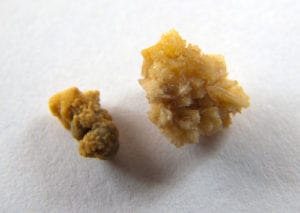Minimize your Risk of Kidney Stones

What are Kidney Stones?
Kidney stones are small crystals that form in the urinary tract. They may be comprised of oxalate and calcium, or of cystine, uric acid, or struvite. Calcium and oxalate stones are the most common. As if the painful presence of stones were not enough, this condition can lead to other, more serious problems, such as infection or kidney necrosis.
Preventing Kidney Stones
Research on kidney stones has revealed that there may be several dietary habits that lower one’s risk of initial or future stones. These include:
- Drink as much water as possible. Usually 10, 10-oz glasses of water are recommended. Dehydration is a key risk factor in developing urinary stones. Drinking caffeinated beverages, and alcohol may dehydrate you further. Apple cider vinegar and beer, no matter what you have heard, do not help prevent stones or help with stone passage. Switching from regular to diet soda may be helpful but does not take then place of drinking water.
- Lemon water provides you with necessary potassium citrate. This alkalizing drink can inhibit the formation of stones by lowering the acidity of urine. Potassium citrate can also prevent existing stones from growing. For therapeutic benefit, you need 4oz of lemon juice throughout the day, added to water. Lemonade usually has too much sugar and may not help with stone prevention.
- Limit animal protein intake.
- Eat plenty of fruits and vegetables. They contain potassium, fiber, magnesium, antioxidants, phytate and citrate, all of which may help keep stones from forming.
- Minimize salt intake to decrease calcium in the urine.
- Reduce the amount of oxalate in your diet. Foods that include high amounts of oxalate include spinach, rhubarb, almonds, chocolate, peanuts or tea. You do not have to remove these things completely from your diet but consuming them in moderation is recommended.
- Reduce refined sugar intake, as some substances promote acid retention in the urine which can lead to uric acid stones.
Individuals who have had recurrent stones, complex, large stones, or developed them as children may require an extensive evaluation of their blood and urine to determine the exact cause.
Our practice also offers supplements to help reduce stone formation. These may be beneficial if you are unable to strictly adhere to the dietary and lifestyle suggestions above or can be used in addition to the other prevention measures. We utilize Theralith XR(link https://www.theralogix.com/product-listing/products-by-category/sp/theralogix-theralith-xr/). This has a combination of vitamins and minerals designed to support and maintain normal urine chemistry.
Questions about kidney stones? Call UT Erlanger Urology. Our urologists located in Chattanooga are experts in managing simple and complicated stone disease. We are a teaching and research site for Boston Scientific and offer cutting-edge and minimally invasive ways to treat stones. We also strive to educate our patients on ways to prevent stones from forming so as to avoid any further pain and lost time with family and at work.

